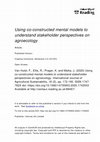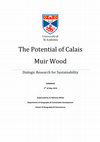Papers by Joshua Msika

International Journal of Agricultural Sustainability, Mar 3, 2020
Agro-ecology has been recognized as a potential route to realizing the multiple economic, social,... more Agro-ecology has been recognized as a potential route to realizing the multiple economic, social, and environmental benefits increasingly required of agricultural systems. However, views on what constitutes agro-ecology differ considerably between countries, and also between stakeholder groups such as natural scientists and farmers. To identify areas of convergence and divergence in understandings of agro-ecology in the Scottish context, we used a novel co-constructed mental modelling approach with a sample of 8 scientists and 7 farmers in the North East of Scotland. Results show that agro-ecology in Scotland is currently mainly understood as a scientific discipline applying ecological analysis to agricultural systems. Farmers' mental models show a wider consideration of the food system, including consumer health, markets and sustainable energy. Precision farming featured prominently in farmers' mental models but not in the scientists' mental models. Our discussion therefore raises the question to what extent precision farming and agro-ecology support or contradict each other. We conclude that although farmers and scientists differ considerably, there are areas of shared understanding, such as the potential of novel crops and new crop rotations, which could be the starting point of working towards an agriculture that delivers multiple benefits.
Global Environmental Change, 2014

Increased participation is increasingly being touted as the appropriate solution to the global (u... more Increased participation is increasingly being touted as the appropriate solution to the global (un)sustainability predicament as it offers ways to adapt better to the shrinking limits of ecosystems and to fill the growing gap left by receding limits of the state. This dissertation examines a participatory process engaged upon to deal with these two sets of limits in Calais Muir Wood, Dunfermline, Scotland and its surrounding community. Co-designed by the woodland ranger and myself, the project sought to implement Freire’s (2000) concept of dialogical engagement. Information leaflet-questionnaires engaged 76 participants while nine unstructured interviews provided opportunities to engage more intensively with interested stakeholders. Outcomes included a set of ‘generative thematic codes’ in diagrammatic form, problematising aspects of the wood and its management, which can now be used to encourage reflection and action in the research participants. I contextualise these by reference to other research on the community benefits of urban woodland. I discuss the research process in light of Arnstein’s (1969) ladder of citizen participation, Freire’s (2000) Pedagogy of the Oppressed and aspects of sustainability research developed by White (2013). This discussion highlights the relevance of Freire’s dialogical process to the process of sustainability research but identifies a twin challenge: Firstly, dialogical processes produce knowledge epistemologically relevant to the examined situation rather than to bodies of academic literature. Secondly, dialogical processes must take place over the long term and this dissertation was thus only able to initiate such a process. If these twin challenges can be addressed, dialogical processes have great potential to help humanity address the ‘oppression’ of unsustainability.
Global Environmental Change, 2014
Motivations:
- Explore academic concepts of community, visioning and universities' roles and res... more Motivations:
- Explore academic concepts of community, visioning and universities' roles and responsibilities.
- Develop a conceptual understanding of the St Andrews "community".
- Identify how Transition: University of St Andrews (www.transitionsta.org) can more effectively initiate practical sustainability action in collaboration with the wider community.
Aims:
- Explore perceptions of the St Andrews community.
- Identify visions for the future for the community of St Andrews.
- Determine how the University is perceived to influence and relate to the community of St Andrews
Conference Presentations by Joshua Msika
Reflections on the theory and practice of re-presenting data to participants.
Presentation by Jo... more Reflections on the theory and practice of re-presenting data to participants.
Presentation by Joshua Msika for the Centre for Ecosystem Change and Human Resilience (CECHR) Symposium, Dundee, 24th of February 2016.
Uploads
Papers by Joshua Msika
- Explore academic concepts of community, visioning and universities' roles and responsibilities.
- Develop a conceptual understanding of the St Andrews "community".
- Identify how Transition: University of St Andrews (www.transitionsta.org) can more effectively initiate practical sustainability action in collaboration with the wider community.
Aims:
- Explore perceptions of the St Andrews community.
- Identify visions for the future for the community of St Andrews.
- Determine how the University is perceived to influence and relate to the community of St Andrews
Conference Presentations by Joshua Msika
Presentation by Joshua Msika for the Centre for Ecosystem Change and Human Resilience (CECHR) Symposium, Dundee, 24th of February 2016.
- Explore academic concepts of community, visioning and universities' roles and responsibilities.
- Develop a conceptual understanding of the St Andrews "community".
- Identify how Transition: University of St Andrews (www.transitionsta.org) can more effectively initiate practical sustainability action in collaboration with the wider community.
Aims:
- Explore perceptions of the St Andrews community.
- Identify visions for the future for the community of St Andrews.
- Determine how the University is perceived to influence and relate to the community of St Andrews
Presentation by Joshua Msika for the Centre for Ecosystem Change and Human Resilience (CECHR) Symposium, Dundee, 24th of February 2016.